Related Research Articles

Nandamuri Taraka Rama Rao, often referred to by his initials NTR, was an Indian actor, filmmaker and politician who served as Chief Minister of United Andhra Pradesh for seven years over three terms. He starred in over 300 films, predominantly in Telugu cinema, and was referred by the media as Viswa Vikhyatha Nata Sarvabhouma. Rao received three National Film Awards for co-producing Thodu Dongalu (1954) and Seetharama Kalyanam (1960) under National Art Theater, Madras, and for directing Varakatnam (1970). Known for his breakthrough performances in Raju Peda (1954) and Lava Kusa (1963), Rao garnered the Nandi Award for Best Actor for Kodalu Diddina Kapuram in 1970, and the Inaugural Filmfare Award for Best Actor – Telugu in 1972 for Badi Panthulu.

Telangana is a state in India situated in Southern part of the Indian peninsula on the high Deccan Plateau. It is the eleventh-largest state and the twelfth-most populated state in India as per 2011 census. On 2 June 2014, the area was separated from the northwestern part of United Andhra Pradesh as the newly formed state of Telangana, with Hyderabad as its capital.
Gurram Jashuva was a Telugu poet. He is legendary figure in the Telugu literary world. With his immense wisdom and through the struggle he faced due to the caste-based discrimination, Jashuva wrote his poetry with a universal approach. He was called the "Poet of the Millennium" for his timeless pieces of poetry and literature.

The Tungabhadra River is a river in India that starts and flows through the state of Karnataka during most of its course, Andhra Pradesh and ultimately joining the Krishna River near Murvakonda in Andhra Pradesh

Telugu literature is the body of works written in the Telugu language. It consists of poems, short stories, novels, plays, and song lyrics, among others. There is some indication that Telugu literature dates at least to the middle of the first millennium, the first extant works are from the 11th century when the Mahabharata was first translated to Telugu from Sanskrit by Nannaya. The language has experienced a golden age under the patronage of the Vijayanagara Emperor-Poet Krishnadevaraya.

Kurnool district is one of the eight districts in the Rayalaseema region of the Indian state of Andhra Pradesh after the districts are reorganised in April 2022. It is located in the north western part of the state and is bounded by Nandyal district in the east, Anantapur district in the south, Raichur district of Karnataka in the northwest, Bellary district of Karnataka in the west, and Jogulamba Gadwal district of Telangana in the north. It has a population of 2,271,686 based on the 2011 census. The city of Kurnool is the headquarters of the district.

P. Bhanumathi Ramakrishna was an Indian actress, singer, film producer, director, music composer, and novelist. She is regarded as the first female super star of Telugu cinema. She is also considered the first female director of Telugu cinema with her debut directorial Chandirani (1953). Bhanumathi appeared in over 100 films predominantly in Telugu and Tamil languages. She was awarded the Padma Bhushan in 2001 for her contribution to the Indian cinema. She was honored among "women in cinema" at the 30th International Film Festival of India.
Avadhānaṃ is a literary performance popular from the medieval era in India. Avadhānaṃ was originated and primarily cultivated among Telugu poets. It involves the partial improvisation of poems using specific themes, metres, forms, or words. The true purpose of an Avadhanam event thus is the showcasing, through entertainment, of superior mastery of cognitive capabilities - of observation, memory, multitasking, task switching, retrieval, reasoning and creativity in multiple modes of intelligence - literature, poetry, music, mathematical calculations, puzzle solving etc.
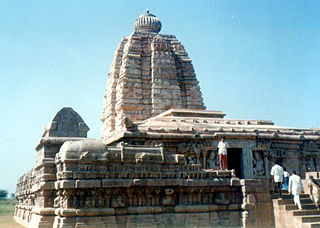
Alampuram (Hemalapuram) is a town situated in Jogulamba Gadwal district in the Indian state of Telangana. Alampur is a popular Hindu pilgrimage site in Shaktism and is also home to the Navabrahma Temples, a group of nine temples dedicated to Shiva built in the seventh and eighth century CE. It is the meeting point of the rivers Tungabhadra and Krishna and is referred to as Dakshina Kasi and is also considered the western gateway to Srisailam. The sacredness of Alampur is mentioned in the Skanda Purana. It is surrounded by the Nallamala hills and is situated on the left bank of the Tungabhadra river. Alampur was ruled by badami chalukyas they built 9 cluster of shiva temples. After them rashtrakutas of manyakheta and western chalukyas of karnataka built papanasi temples. Alampur is home to multiple Telugu and old Kannada inscriptions .Alampur contains numerous Hindu temples, the prominent ones being Jogulamba temple, Navabrahma temples, Papanasi temples, and Sangameswara Temple.
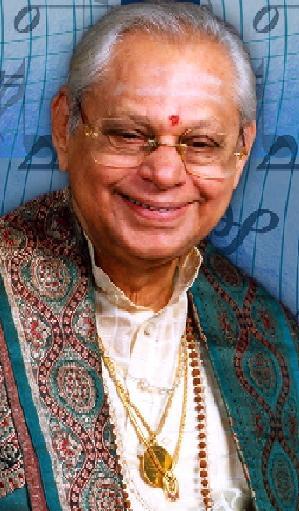
Mahamahopadhyaya Dr. Nookala Chinna Satyanarayana was a Carnatic musician, a classical vocalist, musicologist, author and teacher, a great administrator and motivator. He was a performer on All India Radio and Doordarshan who participated in Sangeeta Sammelans, outdoor broadcasts and national programmes innumerable times. His radio lessons and Bhakti Ranjanis were very popular. He was awarded Padma Bhushan award by the Government of India in 2010.
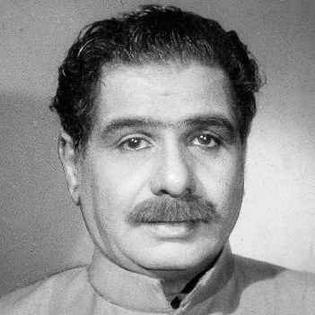
Vuppaladadiyam Nagayya Sarma, popularly known as Chittoor Nagayya, was an Indian actor, singer, music composer, and director known for his works in Telugu cinema, Tamil cinema, and Telugu theatre. Indian film journalist Baburao Patel described Nagayya as "The Paul Muni of India". Nagayya was considered the best character actor in South Indian cinema during 1940s and 1950s. In 1965, he became the first South Indian actor to receive the Padma Shri in Arts from the Government of India for his contributions to Indian cinema.
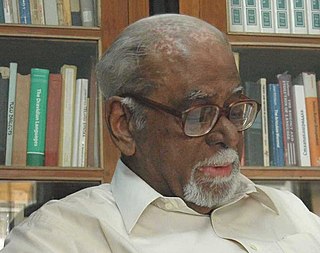
Bhadriraju Krishnamurti was an Indian linguist, specialized in Dravidian languages. He was born in Ongole. He was Vice Chancellor of Hyderabad Central University from 1986 to 1993 and founded the Department of Linguistics at Osmania University where he served as professor from 1962 to 1986. His magnum opus The Dravidian Languages is considered a landmark volume in the study of Dravidian linguistics.
Nataraja Ramakrishna was an Indian dance guru. He was the chairman of Andhra Pradesh Sangeeta Nataka Academy. He was also a scholar and musicologist who promoted classical dance in Andhra Pradesh and worldwide.

Alampuram Navabrahma Temples are a group of nine early Badami Chalukyan Hindu temples dated between the 7th and 9th centuries that are located at Alampuram in Telangana, India, near the meeting point of Tungabhadra River and Krishna River at the border of Andhra Pradesh. They are called Nava-Brahma temples though they are dedicated to Shiva. They exemplify early North Indian Nagara style architecture with cut rock as the building block. The temples of Alampur resemble the style of Pattadakal, Aihole style as they were Karnata Dravida, Vesara style native to Karnataka.

The Culture of Telangana in India has a cultural history of about 5,000 years. The region emerged as the foremost centre of culture in Indian subcontinent during the rule of Kakatiyas, the Qutb Shahis and Asaf Jahi dynasties—. The rulers patronage and interest for culinary, arts and culture transformed Telangana into a multi-cultural region where two different cultures coexist together, thus making Telangana the representative of the Deccan Plateau and its heritage with Warangal and Hyderabad being its epicenter. Hyderabadi cuisine and Kakatiya architecture both from Telangana, are on the list of UNESCO creative city of gastronomy and UNESCO World Heritage Site. The regions major cultural events celebrated are "Kakatiya Festival" and Deccan Festival along with religious festivals Bonalu, Bathukamma, Dasara, Ugadi, Sankranthi, Milad un Nabi and Ramadan.
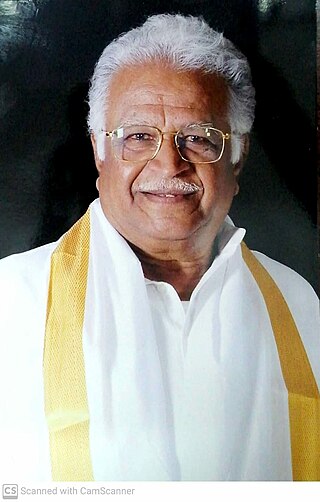
Kolakaluri Enoch is an Indian writer, teacher, and former Vice Chancellor of Sri Venkateswara University, Tirupati. He was honoured by the Government of India, in 2014, by bestowing on him the Padma Shri, the fourth highest civilian award, for his contributions to the field of literature.
Vemulawada Bhima alias 'Vemulawada Bheemakavi' was a hugely popular Telugu poet for his style of poetry and is considered to be a demi-god for his powers.
Abburi Ramakrishna Rao was a pioneer of modern Telugu literature. He was a progressive Telugu writer, scholar, novelist, playwright, literary critic, humanist, professor of Library Science, and the Librarian. Gurajada Apparao, Rayaprolu Subbarao, and Abburi Ramakrishna Rao were considered as the trio of modern poetry, as all their works were published in the same period.

Jogulamba temple is a Hindu temple dedicated to Goddess Jogulamba, a form of Shakti located in Alampur, Telangana, India. The temple is one of the Maha Shakti Peethas, a group of eighteen (Ashtadasa) temples considered the most significant shrines and pilgrimage destinations in Shaktism. Alampur is located on the banks of the Tungabhadra river near its confluence with Krishna river. Jogulamba temple is located in the same complex as that of the Navabrahma Temples, a group of nine Shiva temples built in the seventh-eighth century CE.

Asavadi Prakasa Rao was an Indian poet, critic, translator and scholar, who is known for his poetry and prose works. He is noted for his significant contribution to Telugu and Sanskrit literature. In January 2021, he was awarded India's fourth-highest civilian award the Padma Shri in the Arts and Literature category. As Ashtavadhani, he has given 170 performances and has written and published 50 books across various genres. His most notable literary contribution is his performance of Avadhanam – a literary performance. He has received an honorary D Litt from Potti Sreeramulu Telugu University and a Distinguished Teacher award from the Department of Higher Education, Government of Andhra Pradesh.
References
- 1 2 3 4 5 "Andhra Pradesh / Kurnool News : Belated recognition to a pioneer". The Hindu . 28 December 2007. Archived from the original on 31 December 2007. Retrieved 25 August 2013.
- ↑ "Sahitya Akademi Awards 2007 - General Information - Know India: National Portal of India". Know India. Archived from the original on 22 September 2014. Retrieved 2013-08-25.
- 1 2 "Amma's Column: Gadiyaram Ramakrishna Sharma". Kamat.com. Retrieved 25 August 2013.
- ↑ "Andhra Pradesh News : Razed temple rebuilt after 615 years". The Hindu . 28 February 2005. Archived from the original on 24 May 2007. Retrieved 25 August 2013.
- ↑ "Scholar raises objections to re-installation of Jogulamba idol". The Hindu . 9 October 2003. Archived from the original on 26 October 2003. Retrieved 25 August 2013.